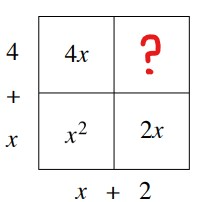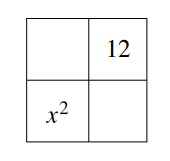Describe what is done to the "b" term when completing the square.
(b/2)^2
Name a, b, and c.
2x2 - 5x - 3 = 0
a=2
b=-5
c=-3
Which number goes in the question mark box?
8
Which is an example of the difference of squares?
a. (x + 2)(x + 2)
b. (x + 7)(x - 7)
c. (x - 3)2
d. (4x + 1)2
B
When solving for x in a quadratic equation, like the one below, what are you finding?
x2 + 6x + 8 =0
The x-intercepts
f(x) = (x^2+5x +?)+2
Which number goes in place of the question mark when completing the square?
25
Substitute a, b, and c into the quadratic formula and show how to set it up.
3x2 + 5x + 1 = 0

What goes in the blank boxes?
x2+7x+12
3x and 4x
Factor the perfect square trinomial.
x2 - 8x + 16
(x - 4)2
Find the x-intercepts.
6x2 - x = 0
x = 0 or x=1/6
Complete the square to find the x-intercept(s).
x^2+2x-3=0
x = 1
How many solutions does this quadratic equation have?
25x2 - 20x + 4 = 0
One
Factor x2 - 15x + 56
(x-8)(x-7)
Factory completely.
9x2 - 36
9(x + 2)(x - 2)
Solve for x.
x2 + x - 20 = 0
x = -5 or x = 4
Use the completing the square method to find the x-intercept(s).
x^2-6x-25 =0
x = 8 and x = -2
Solve using the quadratic formula:
x2 + 4x + 10 = 0
No real solution
(negative under the square root)
Factor 12x2 - 19x + 5
(3x - 1)(4x - 5)
Factor Completely.
4x3 - 9x
x(2x + 3)(2x - 3)
Solve for x.
x2 = 45 - 4x
x = 5 or x = -9
Solve by completing the square.
2x^2+7x+6=0
x=-3/2 or x=-2
Solve using the quadratic equation.
x2 - 5x + 3 = 0

Factor 3x2 + 21x + 36
3(x + 3)(x + 4)
Factor Completely.
4x2 - 8x + 4
4(x - 1)2
Solve for x.
4x2 + 12x + 9 = 0
x = -3/2